LOST 003 - If You Don't, He Will
Ricardus?? I barely KNOW us! Unpacking the TV show LOST—Part 3

Note: this essay was originally published on Revue on January 10, 2022.
OK, back to LOST.
Reminder: My methodology is going to focus first on exhuming as much of the buried understory of LOST as we can, so we’re armed with it before entering the main narrative.
We’ll excavate the understory using what I perceive to be the narrative’s primary dialectic: observation and belief. First we’re going to observe, without concern for what the creators may or may not have intended. Then we’re going to believe, based on what we see.
Last time we looked at a quick snippet from the final episode of Season 5 that set the underlying stakes of the entire narrative—namely, that underlying all this drama is an argument between two godlike beings, over the question of the worthiness of human beings. One of them believes they are not. We’re calling him The Adversary. The other believes they are. We called this entity The Island, though we’ve seen it going by the name “Jacob.”
It’s probably good, then, to understand as much as possible what these two entities are like and how they behave. Luckily, I know just where to look.
Today we’re going to look at an entire episode—one from season 6, the final season. This is the episode Ab Aeterno, which highlights, for the first time, the mysterious character of Richard Alpert. Who is Richard? Richard is somebody our main characters¹ first met as part of a mysterious faction our main characters called “The Others.” (They weren’t the most creative namers of things, our heroes.)
The Others had been on the Island for years prior to our main characters crash landing, and Richard appeared to serve them as an advisor of sorts. By this point, we’ve learned that Richard—who The Others sometimes refer to as “Ricardus"—has been on the Island considerably longer than that.
Perhaps more interestingly, Richard/Ricardus hasn’t aged a day over the decades.
So here’s Richard, aka Ricardus.
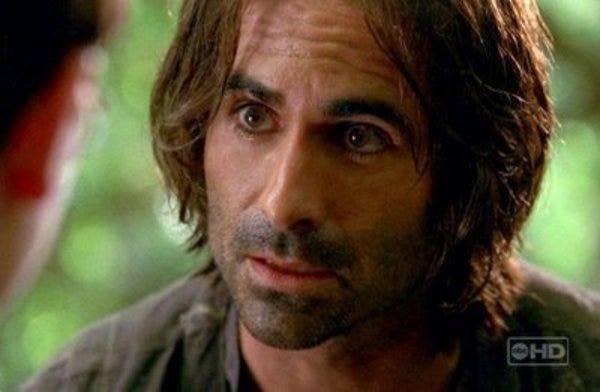
This episode, like most LOST episodes, is bifurcated into a “present day” section featuring our main cast, and an “other time” section (which is frequently though not always a flashback) focused on a single featured character, with the “other time” narrative in many cases lending shades of meaning, understanding, and intrigue onto the present day narrative, and in some cases simply explaining how somebody with tattoos got those tattoos.²
I’m going to attempt to recap this episode as quickly as possible. Watch me go!
O B S E R V A T I O N
First scene: A flashback to maybe a few months before “present day.” Jacob visits a minor character named Ilana, asking her to help him protect six people. (There are other intriguing details, including talk of “candidates,” but I’m not getting into all that mess right now.) He tells her it’s what she has been preparing for. She agrees to help.
Present Day. Ilana’s on the island, with the six people and some others. She reveals to them that Jacob told her to turn in this moment to Ricardus for instruction. Ricardus, who is undergoing a crisis of faith following Jacob’s death, has very recently failed at dynamite suicide, and isn’t feeling like dispensing advice. He announces that he’s know for a long time ago they are all dead, and in hell. This is certainly news to everyone. He says he’s done listening to Jacob, and he’s going to start listening to somebody else. Then he leaves.
That’s probably not the guidance Ilana was hoping for.
Flashback: Canary Islands. 1867. Richard/Ricardus lives there with his wife, Isabella. Turns out his name is Ricardo, not Richard or Ricardus. How hard is it to call somebody Ricardo? That’s a name. One of The Others must be an inveterate nick-namer. Yuck.
Anyway: She’s sick, they’re poor, he rides for the doctor, the doctor has medicine, Ricardo can’t pay, Ricardo fights the doctor, in the scuffle the doctor falls and hits his head and dies. Ricardus rides back with the medicine, but it’s too late; Isabella has succumbed to her illness. Ricardo has only a moment to say goodbye before the authorities arrest him for the doctor’s murder.
Universal health care would have prevented this, just saying.
Ricardo is convicted and sentenced to death, and in prison, though he confesses, the priest refuses to give him absolution for his mortal sin, condemning him to hell. But the priest also has an enterprising streak: noticing that Ricardo has learned English, he sells him to a British slaver, who commutes his sentence and chains him in the hold of a slave ship. The ship is named The Black Rock, and is well known to us viewers as the mysterious vessel that somehow wrecked deep in the jungle on the island’s mainland.
And before you know it, that’s exactly what happens. Riding a tsunami that appears well capable of throwing a ship into the middle of an island jungle, the Black Rock crashes into the statue (beneath which we saw The Island and The Adversary arguing while watching a ship—probably the Black Rock—approach, against a perfectly blue sky). Before the ship crashes, however, one of Ricardus’ fellow captives sees the statue in the distance, and shouts he sees the devil; and this, along with the priest’s condemnation, convinces Ricardus that he is in hell.
Ricardus wakes up in the hold; the ship’s now in the jungle. He’s conscious just in time to see one of his captors descend into the hold and start sword-murdering the prisoners—less mouths to feed. Before Ricardus gets the blade, though, the Black Smoke tikka-tikka-tikka comes and kills everyone real good. Everyone, that is, except Ricardus. The Black Smoke comes down into the hold, looks Ricardus face-to-face, then leaves.
This really bolsters Ricardo’s “I’m in hell” theory.
The Black Smoke. We’ll have seen it before, if we’ve been watching all along. It’s been the main mystery of the island since the beginning, and the suspected main antagonist. We understand it to be the character we’ve seen arguing with Jacob. We’ve seen it get face-to-face with people before. We’ve seen it appear as people who are already dead. We’ve seen evidence that it’s only tangible as smoke, and very murdery. We’ve also seen evidence that there exist limits to who it can murder, and when.
Anyway: Ricardo is still chained in the hold. He suffers a lot. Thirst and pain and all that. Finally somebody comes to him: it’s Isabella. She confirms to him that they are both dead and in hell. She says she’s seen the devil.
This really bolsters Ricardo’s “I’m in hell” theory.
Suddenly, there is unmistakable tikka-tikka-tikka sound of the Black Smoke arriving. Ricardo begs Isabella to leave; she does, then screams, out of sight, from above. It very much sounds like she’s been re-killed.
After some time, a man descends. Ricardo doesn’t recognize him, but we do: it’s the man we’ve been calling The Adversary: the Black Smoke personified. He gives Ricardo water and feeds him, rather tangibly. Ricardo asks if he is in hell. The Adversary confirms that yes, he is. The Adversary claims to have not seen Isabella, and suggests that the devil must have her.
This bolsters the hell out of Ricardo’s “I’m in hell” theory.
The Adversary frees Ricardo, rather tangibly. He helps Ricardo out of the hold, rather tangibly. He feeds him, rather tangibly.
He confirms that he is the Black Smoke, but he claims not to be the devil. He claims to be somebody the devil betrayed; somebody whose body and humanity has been stolen by the devil.
He tells Ricardo that the only way to escape from hell—the only way to ever see his wife again—is to kill the devil. He then changes his story in a key way: he now claims that he did see Isabella, and saw the devil take her. Ricardo apparently doesn’t notice this change.
Then he gives Ricardo a knife and sends him to Jacob, telling Ricardo to kill quickly; he claims the devil is very persuasive, and if you let him speak, it will already be too late.³
Ricardus stumbles out to the beach, lookin’ dazed, feelin’ stabby. We see that the statue is now reduced to rubble and a single foot.
Jacob ambushes him and kicks the shit out of him. Really beats his ass. Takes his knife. Yells at him.
Ricardo, beaten, begs for his wife back. Jacob is confused by this nonsense, until he realizes that Ricardo has been sent by The Adversary.
Then Jacob proves Ricardo is still alive by waterboarding him in the ocean and yelling at him. Ricardo realizes a) he is dying; and b) he doesn’t want to die, so c) ipso facto, he must not be dead. Weird tactic, Jacob, but good job, I suppose.
Jacob then gives Ricardo a blanket and brings out a bottle of wine, and they have a rather important conversation.
(I’m going to keep calling Jacob “The Island.” I promise I’ll explain soon.)
The Island: [displays the bottle] Think of this wine as what you keep calling ‘hell.’ There’s many other names for it, too: malevolence, evil, darkness. And here it is, swirling around in the bottle, unable to get out, because if it did, it would spread. The cork is this island. And it’s the only thing keeping the darkness where it belongs. That man who sent you to kill me believes that everyone is corruptible because it’s in their very nature to sin. I bring them here to prove him wrong, and when they get here, their past doesn’t matter.
Ricardo: Before you brought my ship, there were others?
The Island: Yes. Many.
Ricardo: What happened to them?
The Island: They’re all dead.
Ricardo: But if you brought them here, why didn’t you help them?
The Island: Because I wanted them to help themselves. To know the difference between right and wrong without me having to tell them. It’s all meaningless if I have force them to do anything. Why should I have to step in?
Ricardo: If you don’t … he will.
Jacob, who appears to have not considered this before, offers Ricardo a job as his intermediary, and asks Ricardo to name his wage. Ricardo asks for his dead wife back. Jacob can’t do that. Ricardo asks for absolution for his sins. Jacob can’t do that, either. Then Ricardo asks to live forever so he won’t go to hell. Jacob grants him eternal life.
Later, Ricardo meets The Adversary, and gives him a cryptic message from Jacob: a single white stone. The Adversary seems disappointed but not surprised by Ricardo’s failure at stabbery. He tells Ricardo that his offer still stands, which I guess means “your wife back in exchange for Jacob’s death.”
Present Day: Richard returns to the place of this meeting and calls to The Adversary. He has changed his mind. He wants to know if the offer still stands. He is found, not by the Adversary, but by one of our main characters, Hugo Reyes, aka “Hurley” a young man with the ability to speak to the dead.⁴
Hurley lets him know that Isabella is standing right there. Richard can’t see or hear her. Acting as medium, he facilitates a farewell between the two. For a short time, Richard sees her. They say goodbye. It’s very affecting.
Hugo then advises Richard of Isabella’s final warning: You have to stop the man in black from leaving the island, or “we all go to hell.”
Flashback: Jacob/The Island meets with The Adversary following the unsuccessful stochastic murder attempt. The Adversary ruminates on the white rock, which appears to have been a taunt.
The Island: I see you got my present.
The Adversary: Don’t gloat, Jacob. It doesn’t become you.
The Island: So you tried to kill me.
The Adversary: Do you expect an apology?
The Island: No. I guess I’m just wondering why you did it.
The Adversary: Because I want to leave. Just let me leave, Jacob.
The Island: As long as I’m alive, you’re not going anywhere.
The Adversary: Well then, now you know why I want to kill you. And I will kill you, Jacob.
The Island: Even if you do, somebody else will take my place.
The Adversary: Then I’ll kill them, too.
The Island: [Hands him the bottle of wine] Something to pass the time. [Leaving] I’ll see you around.
The Adversary: Sooner than you think. [He smashes the bottle.]
End of episode. Phew!
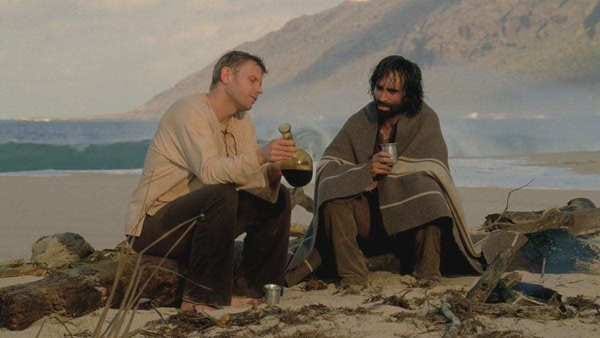
Let’s gather all our observations, in roughly descending order of importance:
1) We have here a reinforcement of an earlier lesson: the fact that underlying all this drama is an argument between two godlike beings over the worthiness of humans. One entity (The Island) has dominion over the other (The Adversary). The entity without dominion wants to kill the one with.
2) The argument plays out in a pattern that has repeated many times over perhaps millennia, whereby The Island brings people as a demonstration of their worthiness, and The Adversary deliberately tries to corrupt them, by learning what they already believe, and then using that to his advantage.
3) The Island doesn’t want to corrupt the experiment by interfering. This suggests strongly that The Island has significant (perhaps limitless) power over reality, which would include the ability to force people to behave as it wants, and extend life indefinitely.
4) Realizing that the experiment is being corrupted by The Adversary, The Island begins using intermediaries, starting with Richard. This suggests that The Island’s exclusive preferred method of acting in the world is through human beings.
5) The Island’s failures thus far to convince The Adversary, and the failures of the people it has brought to provide evidence of success, do not appear to have deterred The Island in the slightest.
6) The Adversary and the Black Smoke are confirmed here as one in the same. It has the ability to manifest as a tangible human body—the man in black. It appears to have many tools apt for corruption, some of which were very evident in this episode, others of which we’ll see evidence of elsewhere. These tools are: the ability to “read” people in face-to-face confrontations; the ability to appear as dead people, and an ability to unnaturally persuade. This last tool it also attributes (probably accurately) to The Island.
7) The Adversary’s power appears to be fairly close to limitless. It seems possible to extrapolate that it is capable of summoning hurricanes from a clear blue sky that can sweep a boat full of humans it despises into the statue home of an enemy it wants to kill, for example. There’s a strong implication that the only thing that can check The Adversary for long is The Island itself. At the very least, The Island seems to believe that if The Adversary was allowed to escape the Island, it would spread everywhere—which (to dip briefly from observation into belief) suggests it would spread everywhere in the universe. Since The Adversary hates all people everywhere and believes them unworthy, this would be bad for all people everywhere, is the obvious point I’d like to make.
8) Both entities appear to agree that a) the physical island itself appears to be the only thing that is keeping The Adversary from escaping; and b) Jacob’s life appears to be the only thing that is keeping The Adversary from escaping … almost to the point that these two things are interchangeable.
Both entities also seem to agree that if the physical body of Jacob is destroyed, another person could take his place … which might suggest a continuance from body to body of a single consciousness.
9) Dead people appear on this island in different ways. Often it is The Adversary, posing as that person for the benefit of his specific target—as was pretty clearly the case when Isabella appears to Ricardo in the hold of the Black Rock. But sometimes it appears to be the actual spirit of the actual dead person, which only some people appear to have the natural ability to see—as is pretty clearly the case when Isabella appears to Hugo and Richard in present day.
10) Jacob sure doesn’t act like a godlike entity. He has a temper and gets impatient and taunts his opponent from a position of power. He’s violent. He’s kind of a dick.
11) Even though this argument and the pattern over which it plays out appears to have been going on for a long time, the murder attempt appears to be something new. This suggests some recent (relatively speaking) change in the status quo.
12) If the cork won’t give, The Adversary appears to be somebody willing to break the whole bottle. He’s somebody who goes around if he can’t go through, is what I mean. He’s got a plan that he intends to spring on The Island.
Now, for my extrapolations based on all this.
B E L I E F
1) I believe Jacob himself is a human intermediary. This follows logically, given The Island is an entity that doesn’t want to interfere. We’ll see very soon that Jacob wasn’t always what he is. He is human, with the failings of a human. The Island speaks through him, because The Island is an entity that does not believe in interfering with the experiment. Jacob is a human who has been given a unique level of communion with The Island’s consciousness, and some measure of The Island’s vast power.
This is why I sometimes refer to Jacob as “The Island” — particularly when I think it is the Island speaking on some level through Jacob.
This means that The Island’s will is being carried out through its intermediary … which means that its will is being carried out imperfectly. And Jacob’s will is being carried out imperfectly through his own intermediaries.
I think there are times when Jacob is unclear on what The Island is actually doing. I’m quite sure there are times when The Adversary is unclear on what The Island is actually doing.
2) I believe that The Island’s primary reason for keeping The Adversary on the island is rehabilitation. I think Jacob thinks he’s trying to prove The Adversary wrong, like a sort of cosmic debate-me bro. But it seems to me The Island is taking a much, much, much longer view, and is trying to prove the same thing about the entity that is The Adversary as it is trying to prove about humanity.
More on this as it unfolds.
3) I believe that The Island is running an experiment, which comprises the universe. One idea that really returns dividends on re-watch is the idea that the island is not just a center of importance, but the central point of importance in the universe; both a cosmic and spiritual hub of all reality.
I suggest that the universe is the experiment, and the scope is larger than human comprehension will allow.
“Prove” for The Island isn’t in the sense of “I have destroyed you with facts.”
“Prove” for The Island is in the sense of an experiment. Hypothesis and proof.
Another way of saying this might be “What happened, happened.”
What is the outcome of this experiment? We’ll get there.
4) I believe that, in much the same way that The Adversary’s true body is black smoke, The Island’s body in physical reality is … the island itself. Hence, why while destroying The Island’s human intermediary would free The Adversary from the rules set by that intermediary, it will be necessary for The Adversary to also destroy the island itself before it can escape into the rest of the universe.
This is why I refer to this entity as “The Island.”
Similarly, I believe that the man in black is a human intermediary for The Adversary—a real person who really lived, who brings his own personality and beliefs and desires to his strange communion with an entity of immense power.
Destroying the body of the man in black would not end the life of The Adversary … but it would sever its specific communion with that particular human, and whatever benefits might attend that communion.
All this suggests that in the world of LOST, consciousness goes beyond the physical … which would explain the ghosts.
5) I believe I don’t yet know what The Adversary means when he says “sooner than you think.” But I think it’s crucial. It comes in response to Jacob saying “see you around.” When does Jacob think that will be? As far as I know, this is the furthest moment in the chronology of the island in which we see The Adversary appear in this man-in-black personification. So where does that personification go after this? When are we in that chronology, and when is the next time that The Adversary sees Jacob again, which will apparently be sooner than Jacob thinks it’s going to be?
The answer, I think, can be found in the alternate worlds and time travel stuff. So more on that later.
6) I believe this installation has gone on long enough. But next time we’re going to get into the real deep stuff.
L O S T
NEXT TIME: Mother, Do You Think They’ll Like My Song?
____
¹ Installment 3 and I haven’t even mentioned the main characters. Wild.
² By asking for them, as it turns out.
³ To an attentive viewer, this knife and these instructions will be very familiar. I’ll come back around to this some day when it’s more relevant.
⁴ Also the ability to be the very best dude. Hurley rules.
_____
A.R. Moxon is the author of The Revisionaries, which is available in most of the usual places, and some of the unusual places. Keats and Yeats are on his side.

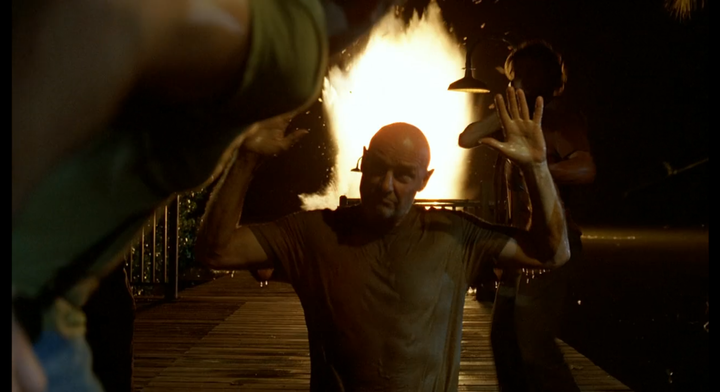
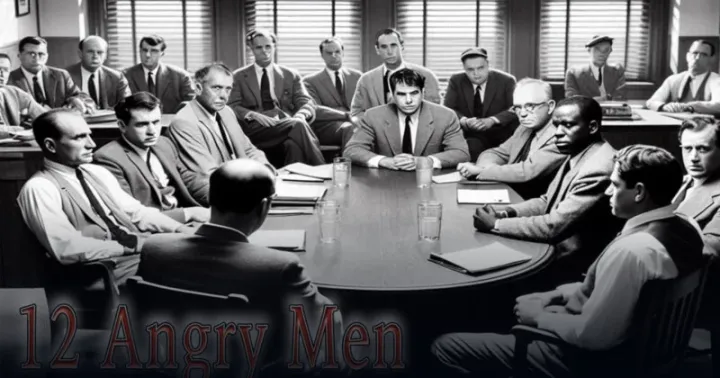
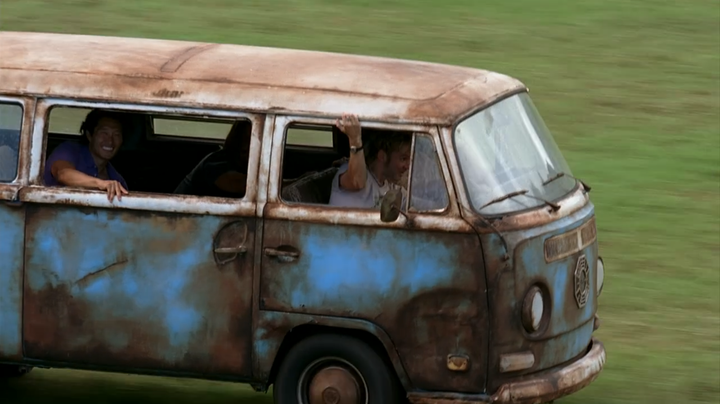
Comments ()